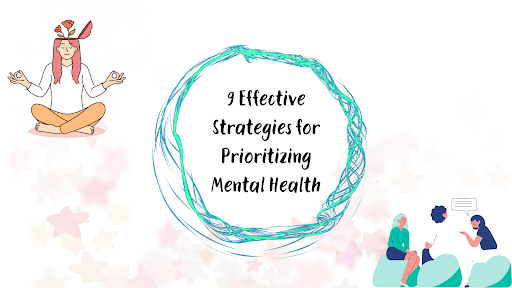9 Effective Strategies for Prioritizing Mental Health

Do you constantly feel stressed, anxious, or emotionally drained? Does it seem like there’s never enough time or energy to properly take care of yourself? You’re not alone. In today’s fast-paced world, mental health often takes a back seat, despite its profound impact on every aspect of our lives. The good news is that with some intentionality and the right strategies, small steps can lead to big improvements in mental well-being.
Continue reading to discover simple yet effective ways to proactively prioritize your mental health, starting today. Don’t wait until you’ve reached a breaking point – with these practical tips, you can begin laying the foundation for lasting mental and emotional health right now.
- Understanding Your Needs
Understanding your own needs is the critical first step to improving mental health. Before taking action, it’s important to check in with yourself regularly and identify any thoughts, emotions, or behaviors that may be negatively impacting your mental state. For instance, addictions of all kinds can compromise mental well-being, whether it be alcohol, smoking, gambling, or substances like opiates. Addictions such as alcohol, opioids, and opiates addiction, in particular, affect millions of lives and take a massive toll on overall health. Being aware of any addiction issues through self-reflection positions you to take the next steps toward managing them.
Strategies such as journaling, mindfulness practices, and emotional check-ins can help strengthen self-knowledge, equipping you to take appropriate actions tailored to your unique needs and situation. The journey to improved mental health begins with self-understanding.

- Establishing an Ongoing Self-Care Routine
Once aware of your needs, establish regular self-care habits. A healthy lifestyle underpins mental wellness. Key elements include:
Regular Exercise: Aim for at least 30 minutes per day of heart-pumping activity. This stimulates feel-good endorphins and reduces stress hormones.
Nutritious Eating: Minimize processed foods and emphasize whole, unrefined foods to stabilize blood sugar and energy levels.
Adequate Sleep: Adults need 7-9 hours nightly for optimal mental health. Maintain a consistent sleep schedule and wind-down routine.
Relaxation Techniques: Yoga, deep breathing, massage, and mindfulness meditation counter stress and anxiety.
Enjoyable Hobbies: Make time for hobbies that spark joy and tap into your purpose. Creative outlets like music, art, or writing can be especially therapeutic.
When self-care becomes a non-negotiable daily priority, you reinforce mental health resilience.
| Category | Recommendation | Benefits |
| Exercise | 30+ minutes of moderate activity daily | Stimulates feel-good endorphins, reduces stress hormones |
| Nutrition | Minimize processed foods, emphasize whole foods | Stabilizes blood sugar and energy |
| Sleep | 7-9 hours per night | Supports optimal mental health |
| Relaxation | Yoga, meditation, deep breathing, massage | Lowers stress and anxiety |
| Hobbies | Creative outlets that spark joy | Promotes joy, purpose, therapeutic benefits |
- Setting Healthy Boundaries
Preserve mental wellness by establishing boundaries in relationships and work. Say no to unnecessary obligations, delegate when possible, and set clear communication expectations. Take regular screen-free breaks to minimize digital overload. Though saying “no” may seem selfish initially, healthy boundaries actually benefit everyone by ensuring you have adequate emotional bandwidth.
- Seeking Support When Needed
During especially challenging times, don’t hesitate to lean on your support network. Speaking with trusted friends, family members, mentors, or mental health professionals can provide guidance and reassurance. Support groups also create a community with people experiencing similar issues. Getting help when you need it prevents small struggles from becoming major crises down the road.
- Finding Mindfulness Through Meditation
Daily mindfulness meditation practice dramatically reduces anxiety, depression, stress, and negative thinking over time. By tuning into the present moment, meditation enhances focus, emotional intelligence, and the ability to manage difficult emotions with compassion. Start with as little as 5-10 minutes per day.
- Journaling for Clarity and Self-Discovery
Writing about thoughts, emotions, and experiences in a journal clarifies inner wisdom and patterns. Journaling evokes catharsis, allowing you to process challenging feelings. It fosters self-motivation by helping align daily actions with your values. Pen-to-paper journaling also stimulates creativity. Set aside 10-15 minutes daily to reap these mental health benefits.
- Moving Your Body to Improve Your Mind
Physical activity beneficially impacts virtually all aspects of mental health. Aerobic exercise acts as a fast-acting antidepressant, stimulating serotonin and endorphins. Resistance training boosts self-esteem. Mind-body practices like yoga improve psychological resilience. And outdoor activities like hiking lower stress hormones. Experiment to find what moves your body in ways that also move your mental state positively.
- Engaging in Fulfilling Social and Creative Pursuits
Humans are wired for connection. Participating in fun, meaningful activities with others protects mental health by fulfilling our need for belonging. Creative and socially engaging ideas include joining a sports team, taking an art class, volunteering at animal shelters, going to concerts, taking dance lessons, joining a book club, or taking nature photography walks with friends. Make time for what energizes you socially and creatively.
- Digital Detoxing for Mental Clarity
While technology has benefits, constantly scrolling social media and staring at screens strains mental wellbeing. Set boundaries around device use. Turn off notifications and take regular social media and news breaks to unwind. Unplug completely on vacation. Limiting digital noise enhances concentration, provides space for reflection, and reduces anxiety and depression.
Addressing Key Challenges in Prioritizing Mental Health
Along the journey to improve your mental health, you’ll inevitably face challenges. Some common hurdles and how to tackle them include:
Lack of motivation: Begin with small, manageable steps instead of major overhauls. Focus on one new habit at a time before building up. Share your goals with a supportive friend for accountability.
Too exhausted: When completely drained, simply take 15 minutes to meditate, cook a nutritious meal, or write in a journal. Start small to avoid burnout.
Forgetting to make it a priority: Schedule time for self-care just like any other obligation. Use phone alerts for reminders to exercise, call a friend, or take a digital detox break.
Overwhelmed by options: Refer back to your core needs and values. Experiment to discover the strategies that best support your mental health goals.
| Hurdle | Solution | Example |
| Lack of motivation | – Begin with small, manageable steps- Focus on one habit at a time- Share goals with friends for accountability | – 10 minute walk – Eating more vegetables – My goal is to meditate for 5 minutes every day |
| Exhaustion | – Take 15 minutes for meditation, healthy cooking, or journaling- Start small to prevent burnout | – Reach out to valuable connections, call a friend – Try morning yoga, journaling, and no screens before bed to see what helps sleep |
| Forgetting to prioritize | – Schedule self-care time like other obligations- Set phone alerts to remind for self-care activities | – Block calendar 8-8:30 AM for exercise – Phone alert for screen break every 2 hours |
| Overwhelmed by options | – Refer to core needs and values – Experiment to find optimal strategies | – Reach out to valuable connection, call a friend – Try morning yoga, journaling, and no screens before bed to see what helps sleep |
Final Thoughts
Mental health affects all facets of wellbeing, yet frequently falls by the wayside amidst the demands of daily life. By becoming self-aware, establishing self-care habits, setting boundaries, utilizing your support system, adopting mindfulness practices, journaling, exercising, engaging in rewarding activities, taking media breaks, and overcoming roadblocks, you can take small but mighty steps to transform your mental health.
Put these 9 key strategies into practice, rather than waiting for a wake-up call. With regular time and intention, your emotional resilience will compound, providing a foundation to handle life’s curveballs while thriving. When you prioritize mental fitness, you are investing in every area of your health and fulfillment.
Frequently Asked Questions
- How can I make time for mental health on a busy schedule?
Allocating time for mental health amidst a busy schedule can seem challenging, but it’s crucial for maintaining overall well-being. Start by identifying small pockets of time for mindfulness or breathing exercises, such as during your morning routine or right before bed. Incorporate these practices into your daily schedule as non-negotiable elements, similar to important meetings or appointments. Over time, these small practices can significantly contribute to your mental health without overwhelming your schedule.
- Is there scientific evidence that exercise improves mental health?
Yes, numerous studies support the positive impact of exercise on mental health, showing it can help reduce anxiety, depression, and negative mood by improving self-esteem and cognitive function. Exercise releases endorphins, which are chemicals in the brain that act as natural painkillers and mood elevators. Regular physical activity, even short daily walks, can significantly improve sleep, which in turn reduces stress. Starting with activities you enjoy can make it easier to incorporate exercise into your routine.
- What indicators suggest I need better boundaries for my mental health?
Indicators that you might need to set healthier boundaries include feeling consistently overwhelmed or drained by your interactions with others, experiencing resentment towards people who demand your time and energy, and neglecting your own needs and well-being. Setting boundaries is essential for mental health, as it helps manage stress and avoid burnout. Begin by clearly communicating your limits to others and sticking to them, which will foster healthier relationships and a better sense of self-respect.
- How can I practice mindfulness without traditional meditation?
If traditional seated meditation doesn’t suit you, there are many other ways to incorporate mindfulness into your daily life. Focus on engaging fully with the present moment during routine activities, like feeling the water temperature while washing dishes or noticing the sensations in your feet as you walk. Mindful listening to music, guided imagery exercises, or even mindful coloring are effective alternatives that can provide the benefits of mindfulness, such as reduced stress and improved focus.
- What are effective stress management strategies for workplace stress?
Managing workplace stress effectively involves several key strategies, such as prioritizing and delegating tasks to avoid feeling overwhelmed, establishing clear work-life boundaries to ensure downtime, and practicing mindfulness or stress-reduction techniques during breaks. It’s also helpful to communicate openly with your employer or colleagues about workload expectations and seek support when needed. Incorporating physical activity into your day can further mitigate stress and improve your mental resilience.
- When should I consider seeking professional help for my mental health?
Consider seeking professional help if you notice persistent feelings of sadness, anxiety, or stress that significantly impact your daily functioning, relationships, or work performance. If self-help strategies and support from friends and family aren’t enough to manage these feelings, a mental health professional can offer personalized guidance and treatment options. Remember, seeking help is a sign of strength and an important step towards taking control of your mental health.
- How does sleep affect mental health, and how can I improve my sleep habits?
Sleep plays a critical role in mental health, affecting mood, cognitive function, and stress levels. Poor sleep can exacerbate mental health issues, while quality sleep can enhance emotional resilience and well-being. Improve your sleep by establishing a regular sleep schedule, creating a restful environment free from screens and distractions, and adopting a relaxing bedtime routine. Avoiding caffeine and heavy meals before bed can also promote better sleep quality.
- How can I balance social needs with the need for solitude?
Balancing social connections and solitude involves recognizing your personal needs for interaction and alone time. Set aside quality time for social activities that energize you, while also scheduling periods for solitude to engage in self-reflection or activities you enjoy alone. Communicating your needs to friends and family can help them understand and respect your balance. This approach ensures you can recharge and maintain healthy, fulfilling relationships.
- What simple practices can I incorporate daily to improve my mental well-being?
Incorporating simple practices like expressing gratitude, spending time in nature, and engaging in physical activity can significantly boost your mental well-being. Start or end your day by listing things you’re grateful for, take short walks outside to connect with nature, and find opportunities to move your body in ways that bring you joy. These practices can enhance your mood, reduce stress, and promote a more positive outlook on life.
- How should I address mental health stigma in my community or workplace?
Addressing mental health stigma involves education and open conversations. Share accurate information about mental health to dispel myths and encourage a more understanding and supportive environment. Offering personal experiences or examples can make the issue more relatable. Advocating for mental health resources and support in the workplace or community can also help to normalize seeking help and foster a culture of wellness.
- Can changing my diet affect my mental health?
Yes, diet plays a significant role in mental health. Nutrient-rich foods, particularly those high in omega-3 fatty acids, antioxidants, and vitamins, can support brain health and improve mood. Aim to incorporate a variety of whole foods, such as fruits, vegetables, whole grains, and lean proteins, into your diet. Staying hydrated and limiting processed foods and sugar can also have positive effects on your mental well-being.
- How do creative activities benefit mental health, and where do I start?
Engaging in creative activities can reduce stress, improve mood, and offer a sense of accomplishment. Activities like painting, writing, crafting, or playing music allow for self-expression and can be therapeutic. Start with something simple that interests you, and remember, the focus is on the process, not the outcome. Setting aside regular time for creativity can nurture your mental health and provide a rewarding escape.
- What strategies can help with digital detoxing for mental health?
To effectively detox digitally, set specific times of the day to check emails and social media, and designate tech-free zones in your home. Engage in offline activities you enjoy, like reading, cooking, or spending time in nature, to replace screen time. Establishing tech-free times, such as during meals or before bed, can also improve interpersonal connections and sleep quality.
- How can volunteering contribute to my mental health?
Volunteering offers a unique opportunity to connect with others, build a sense of community, and find purpose. Helping others can boost your self-esteem, reduce feelings of loneliness, and provide a new perspective on your own life challenges. Choose volunteer opportunities that align with your interests or values to ensure a fulfilling experience.
- What are the benefits of journaling for mental health, and how do I start?
Journaling can serve as a powerful tool for self-reflection, stress relief, and processing emotions. Start by setting aside a few minutes each day to write freely about your thoughts, feelings, or experiences. There’s no right or wrong way to journal; the goal is to express yourself honestly and openly. Over time, journaling can offer insights into your mental patterns and help you identify strategies for personal growth and well-being.





